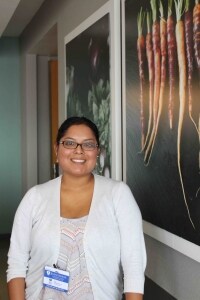
Title: Public Health Training Certificate in American Indian Health
Location: Navajo
Biography
Yáátééh. Shi’e’i’ Amanda Skenadore yinishye’. Kinyaa’aanii’ nisli’ Tl’aashchi’i’ ba’ shischiiin. Hello, my name is Amanda Skenadore. I am born for the Towering House people and born into the Red Cheek Clan.
Currently, I am a Professional Research Assistant at the University Of Colorado School Of Medicine. I assist with investigating health disparities in American Indians, particularly in association to cardiovascular health. Our study aims to help American Indian patients in the Denver area maintain or decrease their high blood pressure – to help improve their overall health outcomes. I enjoy my job immensely because I have the opportunity to work one on one with American Indian patients.
I’ll Always Be A Rez Girl
I live in Denver now, but I’ll always be a reservation girl at heart. Although being raised on the reservation was not without its difficulties, I attribute so much of my strengths to my upbringing in Chinle, Arizona. I was raised learning my Navajo culture and language. My mother has always been very adamant about us being surrounded in a Navajo speaking home. This foundation has shaped me into the woman that I am today.
Reservation life can be tough and challenging. Things we take for granted each day such as running water were small luxuries that I did not grow up with. My mother and step-dad drove our pickup truck to get water once a week. Reservations also have some of the highest rates of diabetes, poverty, heart disease, etc. As a child on the reservation, I had witnessed how health disparities negatively impact an individual, families, and communities. This led me to an interest in the public health field.
There is an assumption that reservations schools are not equipped to adequately prepare students. However, I do feel that I received a good education. I had good mentors along the way, especially my high school English teacher, she encouraged us to go further with our education. These mentors inspired hope that I could make a difference and provided me with the tools that I still use today.
After high school, I obtained my bachelor’s from Fort Lewis College, exercise specialist option. I then became a health educator at Native Health where I provided education about chronic disease to urban and tribal programs in Phoenix.
Following my post-undergraduate career, I had a desire to expand my education and in 2013 I earned my Master of Public Health at the Colorado School of Public Health with a community health concentration.
Studying At Johns Hopkins
The Colorado School of Public Health helped enhance my educational foundation, but I felt that I needed to acquire more knowledge as a public health professional. More specifically, I needed to learn more about my people and how to implement my ideas for improving the health of my communities.
In 2014, I began my journey with Johns Hopkins Bloomberg School of Public Health and the Center for American Indian Health. My first day at Johns Hopkins was a welcomed discoveryI met all these amazing Native students doing so much in their communities! A lot of us have the similar goals and we all want to help: it gave me hope that together we could all really make a difference. This strengthened my self-efficacy by being taught with other Native students, by wonderful faculty and staff, and at a very prestigious school.
The certificate program and coursework is specialized with the American Indian health professional in mind. It is very unique in the way they incorporate traditional Native teachings into their curriculum. For instance, in our class Mental Health Care and Delivery in American Indian Communities they brought out a traditional Navajo medicine man who spoke about balancing tradition and western approaches to mental health and well-being.
It is the goal of the certificate program to help students gain multidisciplinary public health approaches and develop more culturally competent strategies. The course work has helped me increase my understanding of public health in the realm of tribal sovereignty, tribal health systems, and tribal communities.
What do I want to be doing in five years?
I want to get my DrPH and help lead different public health initiatives and programs on the Navajo reservation. I want to help recognize health priorities and help decrease the impeding health issues affecting the American Indian population.
It has been a great blessing for me to further my public health education with the Public Health Training Certificate for American Indian Health Professionals. Ahe’hee.